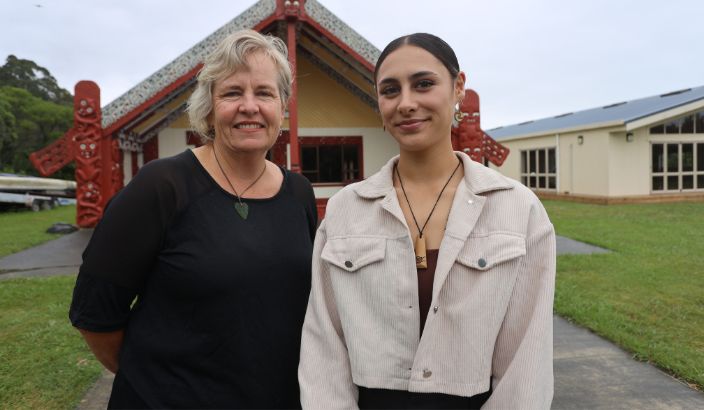Agency and iwi sign Kawenata


TeTauihu Community Development Agency chair Megan Courtney, left, and Kiriwai Spooner of Ngāti Rārua (one of the eight iwi who signed the Kawenata).<em> Photo: Gordon Preece</em>
Strokes of pens at Whakatū Marae on Tuesday marked a new era for an agency seeking an intergenerational approach to strengthening the economy and well-being of the rohe (area).
Te Tauihu Community Development Agency (TTCDA) was initiated in July 2024 as the first regional entity dedicated to supporting, connecting, and advocating for the more than 1400 Te Tauihu for-purpose organisations.
The signing of the Kawenata (treaty) by eight local iwi others in both personal and agency capacities for a partnership with the agency embedded values of whanaungatanga, manaakitanga, and rangatiratanga into TTCDA’s operations.
Chair Megan Courtney says local councils and government agencies had also supported the approach and it was “really exciting” that iwi was now involved.
“When you engage early with iwi, and you find some things that you both care about together, you can move forward and work together for the long term, to do better for all of our communities,” she says.
“We see the Kawenata as a living document that all those that engage with the agency and are working with the community also sign as a sign of their commitment to intergenerational well-being.”
Megan says the main projects undertaken by the agency had included upskilling community organisations with artificial intelligence (AI) and there is a current “strengthening in the sector survey” to identify organisations’ needs.
She says there was a trio of strong feedback received to date for the agency to execute.
“Looking for ways to improve efficiencies and effectiveness, can we find ways of sharing communications and media resources, or can we find new ways of sharing accommodation or even sharing governance?” she says.
“The second thing people have said is that they’re really desperate for more connection, and to build collective skills and leadership and find ways to collaborate.
"The third bit that people said that they wanted this agency to focus on was voice and advocacy for the sector,” she says.
Megan says it was also financially “really tough” for many small community groups and there will be workshops to address the issue over the next six months.
“With the right relationships we can work through challenges or anything that comes up along the way,” she says. “This Kawenata is about an enduring relationship, and I think that’s what makes it different to most other documents.”
